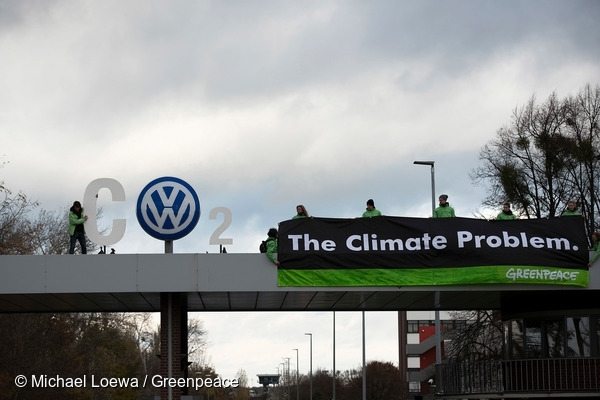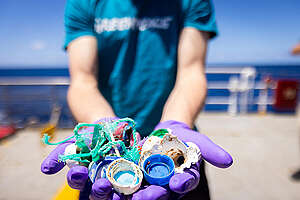If lying about the nitrogen oxide emissions of 11 million of its cars were not bad enough, German carmaker Volkswagen shocked us again when it revealed it had understated the CO2 emissions of its cars in Europe as well.

Greenpeace Aktivisten empfangen VW Aufsichtsrat mit Protestbanner ueber dem Werkstor. Die Umweltschuetzer fordern ehrliche Messbedingungen und -werte bei Abgastests . Am Haupteingang des VW-Werkes veraendern Kletterer das VW-Logo in ein CO2-Zeichen. Die Umweltschuetzer fordern vom VW-Aufsichtsrat mehr Transparenz bei Abgastests und konkrete Daten, die zeigen, wie hoch der aktuelle CO2-Flottenwert des Konzerns tatsaechlich ist.
This is why Greenpeace Germany activists paid another visit to Volkswagen’s Wolfsburg factory today, unveiling a banner that transformed the company’s logo into the CO2 symbol with the words ‘The climate problem’.
There is a solution, however. But it’s a solution that will require far-reaching changes to our mobility system to embrace an emissions-free and community-friendly transportation system.
Just over a month after Volkswagen admitted it cheated on diesel emissions tests, VW confessed last week that it had also understated CO2 emissions on about 800,000 cars in Europe.
In the lead-up to the UN climate talks in Paris next month, Volkswagen’s emissions scandal has now cast an even brighter spotlight on the road transport sector and how governments and regulators need to ensure the industry cleans up its act.
This requires a seismic shift in how governments have up until now bowed to the car industry lobby and too often opted to ease regulations rather than improve car testing systems to keep dangerous polluting cars off our roads.
Greenpeace is calling on the German government to use the Volkswagen crisis as an opportunity to transform its national transport policies and provide international mobility leadership – similar to how its Energiewende has afforded a roadmap for a renewable energy transition.
This model of mobility, a Transportwende, needs to embrace public transport, emissions-free vehicles and provide for better cycling lanes. Volkswagen, its reputation in tatters, can still be part of the technology solution.
Countries such as the Netherlands and Denmark are already on their way towards setting good policy examples.
In Copenhagen, the number of kilometres travelled by bicycle has increased by 30% since 1998. The Danish government achieved this by implementing a strong policy to expand public transport and the bicycle network as Copenhagen strives to become CO2 neutral by 2025.
Across in the Netherlands, the Dutch capital Amsterdam – also famous for its bicycles – has shown how reduced traffic leads to higher quality of life.
But in cheating on nitrogen oxide emissions tests, Volkswagen has instead put public health at greater risk of pulmonary diseases, while ‘irregularities’ in its CO2 emissions also show how the company is complicit in and profiting from climate change.
Greenpeace is demanding that Volkswagen come clean and reveal the true extent of its CO2 emissions. For a company that committed in 2013 to reduce the CO2 fumes of its new car fleet to 95 grams per kilometer by 2020, it remains a mystery how we can judge the company’s performance.
In putting its profits above the health of our families and our climate, Volkswagen must now be held accountable. And this is where you can help! Join us in calling for change.
Daniel Moser is a Mobility Campaigner with Greenpeace Germany.[bctt tweet=”VW’s CO2 emissions = Das problem” via=”no”]

